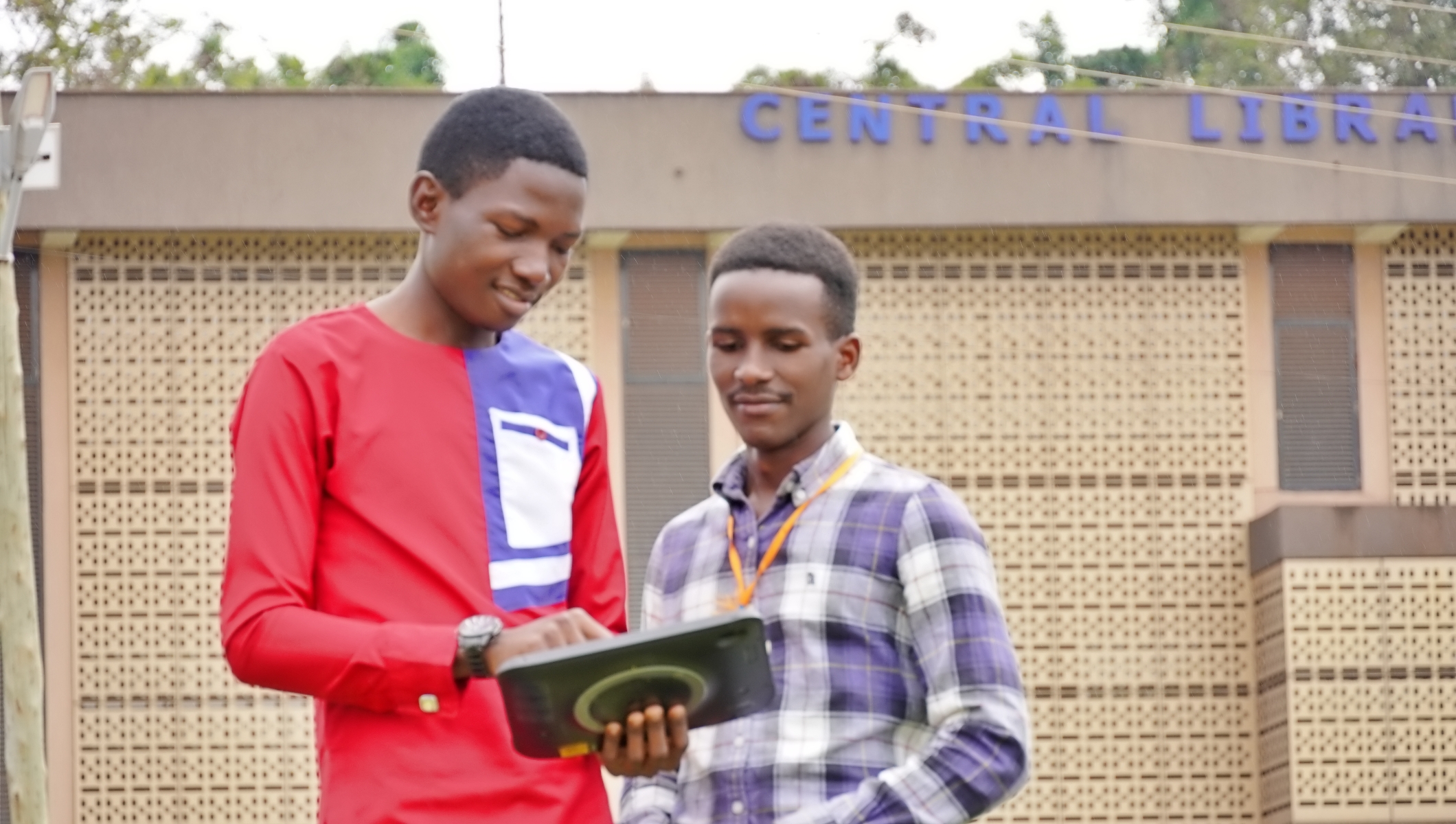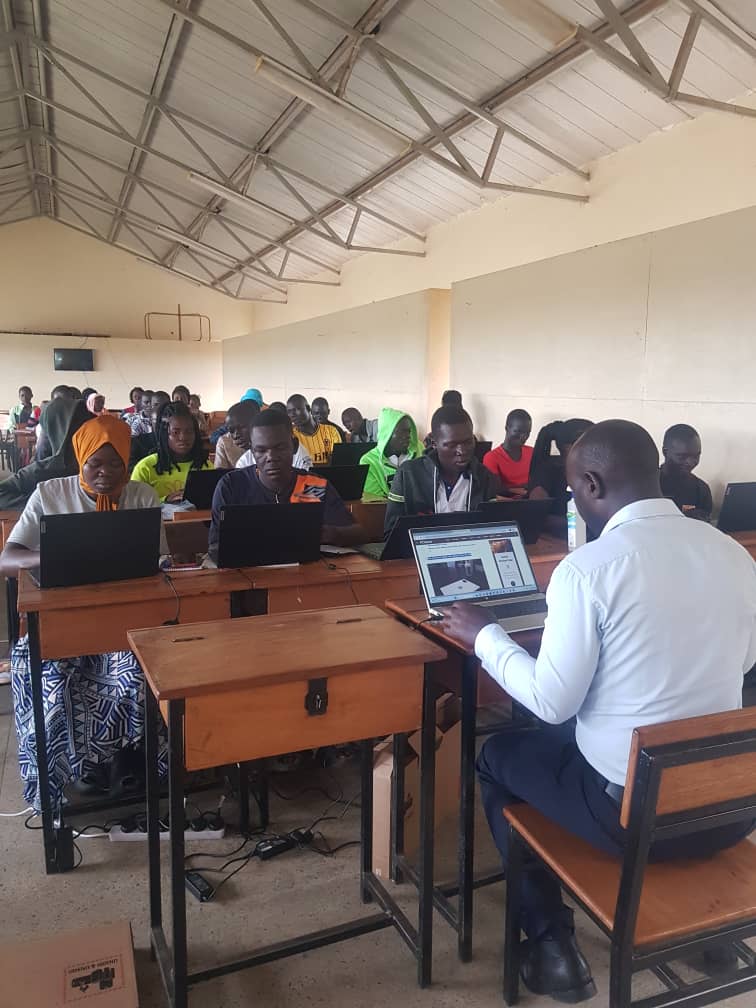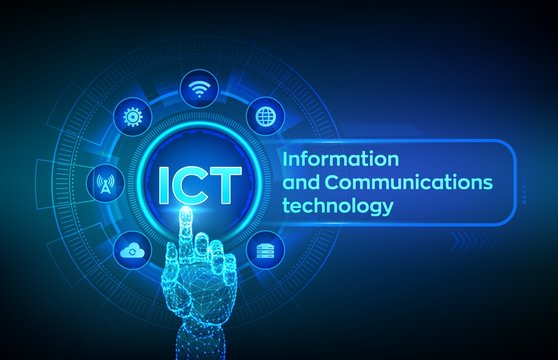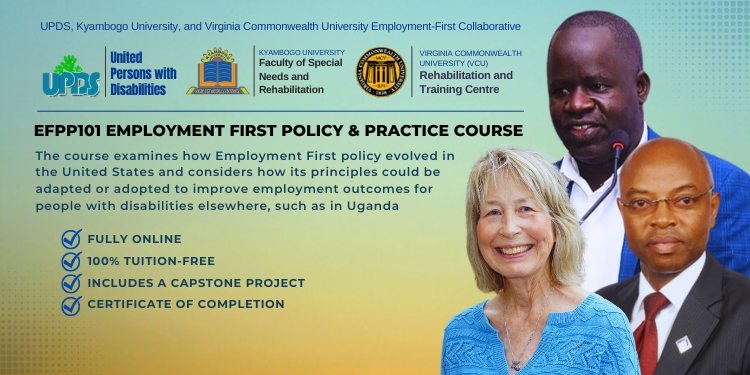- Lecturer: Mr. Asiku Caesar Odama
KELMS (Kyambogo E-learning Management System)
-
The Faculty of Special Needs and Rehabilitation

The Faculty of Special Needs and Rehabilitation has a long and rich tradition in the training of teachers and other professionals in special needs education, rehabilitation, and inclusive development.
The mission of the faculty is to ensure equalization of opportunities for persons with disabilities and other special needs through human resource development and the production of assistive devices for the promotion of learning and independent living. For this reason, all the students who study at the faculty undertake courses that are uniquely designed with skills in braille, sign language, mobility and orientation skills and early indentification of learning needs and impairments in children, young people, and adults.
In addition, the faculty, through its outreach programme collaborates with organisations of persons with diabilities and development partners in disability, special needs, inclusive education and rehabilitation to promote social justice and inclusive development. The undergraduate and graduate programs offered are located under the departments of Adult and Community And Life Learning (DACOL), Community and Disability Studies (CDS) and Special Needs Studies (SNS). Approximately 2000 students are studying different courses in the faculty serviced by well-qualified staff mostly with Doctoral Degrees and especially skilled in their areas of expertise in disability, special needs and inclusive education, rehabilitation, adult education, community development, and social justice. The technical staff provide support services through Uganda Sign Language interpreting, Mobility Guide and reading for the blind, disability assessment and speech and language therapy.

Available courses
- Teacher: Lukoma Lukoma
- Teacher: Sebastian Lukoma
- Lecturer: John Buyinza
- Lecturer: Sebastian Lukoma
- Teacher: Mr. Bayo Asher
- Lecturer: Prof. Willy Ngaka
- Lecturer: Mary Nakimwero
- Lecturer: Mary Nakimwero
- Teacher: Sebastian Lukoma
- Lecturer: Mr. Orech Emmy Hendrain
- Lecturer: Orech Emmy Hendrain
- Lecturer: Sebastian Lukoma
- Lecturer: Mr. Orech Emmy Hendrain
- Lecturer: Orech Emmy Hendrain
- Lecturer: Sebastian Lukoma
- Lecturer: Mr. Asiku Caesar Odama
- Lecturer: Sebastian Lukoma

This course is designed for beginners who want to learn essential laptop skills and how to maintain their laptops effectively. Participants will gain hands-on experience in charging, shutting down, navigating through their laptops, connecting to the internet, using emails and social media, sharing files both online and offline, and ensuring safety and security while using their laptops.

This course will introduce the learner to understand about deafness, the deaf community,, Ugandan sign language and help the learner to communicate with a deaf person.
- Lecturer: Bonnie Busingye
- Lecturer: Mr. Orech Emmy Hendrain
- Lecturer: Orech Emmy Hendrain
- Lecturer: Mr. Asiku Caesar Odama
Course Description
The course covers theories, milestones and difficulties in the development of language for children with intellectual impairment. It also covers the assessment of the communication skills and various communication techniques that can be used with and for persons with intellectual imapairment
- Lecturer: Mr. Asiku Caesar Odama
- Teacher: Mr. Orech Emmy Hendrain
- Teacher: Orech Emmy Hendrain
- Lecturer: Mr. Orech Emmy Hendrain
- Lecturer: Orech Emmy Hendrain

- Lecturer: Mr. Bayo Asher
- Lecturer: Christopher Azoora
- Lecturer: Khaemba David Kam
- Lecturer: Joseph Odeke Nato
- Lecturer: Bugohe Peter
- Lecturer: Dr. Odette Tumwesigye Niyisabwa

- Teacher: Dr. Nuwagaba Kabakyenga Ponsiano
- Teacher: Binasali Kyebagadha
- Teacher: Dr. Odette Tumwesigye Niyisabwa
- Teacher: Mr. Locoro Victor
- Lecturer: Robert Okello
- Lecturer: Robert Okello
- Lecturer: Bonnie Busingye
- Lecturer: Bonnie Busingye
This course introduces the students to the basic knowledge and skills of using computers. It emphasizes the use of Microsoft Windows, Ms. Word, Ms. Excel and the Internet.
- Lecturer: Binasali Kyebagadha
This course introduces students to the basic knowledge and skills of reading and writing Grade I Braille.
- Lecturer : Binasali Kyebagadha
In this course you will explore the different kinds of interaction and
communication relevant to persons with deafblindness/ MSI.How you communicate with persons with deafblindness/MSI will differ depending on the unique needs of the individual You will learn the
practical skills needed to facilitate understanding between deafblind children
and their communication partners.

- Lecturer: Dr. Nuwagaba Kabakyenga Ponsiano
- Lecturer: Sebastian Lukoma

This course equips students with knowledge on social deviance, crime and its management. It examines theories, causal factors, criminal procedures and institutional framework relating to crime and social deviance. The course further explores community’s role in prevention and management of social deviance and crime.
Course objectives
The course aims to provide students with:
- Knowledge of theories of social deviance and crime.
- Insights into common social deviant behaviours and prescribed crimes.
- Knowledge on management of social deviance and crime.
- Knowledge on the national criminal justice system.
Learning outcomes
By the end of the course students should be able to:
- Demonstrate ability to apply theories and principles of crime and social deviance in community development practice.
- Analyse common social deviant behaviours and prescribed crimes.
- Demonstrate knowledge on guiding and educating the community on management of social deviance and crime.
- Describe the criminal procedures and practices in Uganda.
Mode of delivery
The course will be delivered using interactive face to face and online lectures, group discussions, brain storming, field visits, case studies, guest speaker, and library and e-information resources.
Assessment
- Course work 40%
- Final Examination 60%
Total 100%
- Teacher: Vincent Kisekka
- Teacher: Sebastian Lukoma
- Teacher: Jonan Nduhuura

The course enables students to examine gaps that limit the participation of persons with disabilities and other vulnerable conditions in society. It emphasizes the importance of equalization of opportunities and use of human rights-based service provision approaches to promote inclusion of and social justice for persons with disabilities in development initiatives.
- Teacher: Jacinta Nyadoi

This is to certify that the participant has completed the Safeguarding Essentials training program, demonstrating their commitment to protecting the welfare and well-being of children, young people, and vulnerable groups. This course was developed in partnership with Cyber School Technology Solutions and the Mastercard Foundation Uganda.
- Teacher: Lukoma Lukoma
- Teacher: Sebastian Lukoma
- Teacher: Samson Busiku
- Teacher: Julius Patrick Omugur
- Teacher: Jacinta Nyadoi

- Lecturer: Rita Akello
- Lecturer: Sebastian Lukoma

The Employment-First Policy and Practice course will discuss and explore employment-first policy, planning, and implementation with a focus on its historical development in the United States. The course will examine how this policy has evolved and consider how its principles could be adapted or adopted to improve employment outcomes elsewhere. Students will be trained to recognize individual sensitivities, perceptions, and viewpoints that encourage, inform, and shape employment outcomes for individuals with disabilities.
- Teacher: Denis Ouma
- Teacher: Wendy Parent-Johnson
- Teacher: Ojok Patrick
- Teacher: Cindy Amony
- Teacher: Cindy Amony
- Teacher: Cindy Amony
- Teacher: Cindy Amony
- Teacher: Cindy Amony
- Teacher: Cindy Amony
- Teacher: Isiah Walusimbi
- Teacher: Fiona Nambogo
The Digital Pedagogy course is designed for instructors
A dynamic exploration of innovative teaching methodologies in the digital age. This comprehensive program delves into the integration of technology and pedagogy, empowering instructors to leverage digital tools for enhanced student engagement and learning outcomes. environment.
- Teacher: Fiona Nambogo
Skip site announcements




